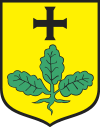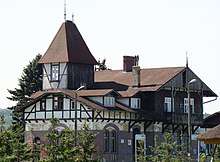Tolkmicko
Tolkmicko (pronounced TOLK-mitzko [tɔlkˈmit͡skɔ], German: Tolkemit) is a town in northern Poland, on the Vistula Lagoon, about 20 km northeast of Elbląg. It is located in Warmian-Masurian Voivodeship, in Elbląg County. Its population is 2,766 (2004)
Tolkmicko | |
|---|---|
Gothic Saint James church | |
 Coat of arms | |
 Tolkmicko | |
| Coordinates: 54°19′14″N 19°31′50″E | |
| Country | |
| Voivodeship | Warmian-Masurian |
| County | Elbląg |
| Gmina | Tolkmicko |
| Area | |
| • Total | 2.28 km2 (0.88 sq mi) |
| Population (2006) | |
| • Total | 2,731 |
| • Density | 1,200/km2 (3,100/sq mi) |
| Postal code | 82-340 |
| Climate | Dfb |
| Website | http://www.tolkmicko.pl |
History
Middle Ages
The site was first settled by Old Prussian tribes. The city law (Stadtrecht) followed the incorporation of the territory into the State of the Teutonic Order in 1296 and was based on the German Kulm law (Kulmer Recht) by order of Ludwig von Schippe, then commander of the Teutonic Knights. On 21 March 1351 the Grand Master of the Teutonic Knights Heinrich Dusemer renewed the municipal law and together with the village of Neuendorf (now Nowinka) Tolkmicko obtained fishing legislation. In 1390 Peter Turnow, the Theologian later burned at the stake as a heretic in 1426, was born here.
On 3 April 1440 it became part of the Prussian Confederation. In 1454 the town recognized the Polish King as rightful ruler and joined Poland. During the Thirteen Years’ War (1454–1466), in 1456 it was ravaged and plundered by the Teutonic Knights.[1] After the Second Peace of Thorn (1466), Tolkmicko was part of the Polish Malbork Voivodeship of the autonomous province of Polish Prussia. It was seat of a county.[2]
Modern era
During the last Polish–Teutonic War, in 1521 the Teutonic Knights, while retreating after the unsuccessful siege of Elbląg, briefly captured the town.[1] In 1525, during the Reformation, the Church property formally became the parish church Tolkemit Evangelical Lutheran church. This was undertaken by a former monk named Bommler, son of the mayor of Tolkmicko. The town however remained in the Roman Catholic Bishopric of Warmia and thus remained subject to Catholic rule. After 1569 the special legal position of Polish Prussia within royal Poland was slowly undermined, and the town was formally absorbed into Poland proper in 1572. It became part of the larger province of Greater Poland.
During the Polish-Swedish war the Swedish King Gustav II of stayed in the town during 1626. Two large fires, in 1634 and 1694, partially destroyed the town.
The outbreak of the plague in 1710 halved the number of residents, although in 1720 there were enough people to justify building a brewery in the marketplace. There was yet another town fire in 1767, destroying the brewery, the Church and the Town Hall.
During the first partition of Poland in 1772, the region was annexed by the Kingdom of Prussia and remained part of the province of East Prussia from 1773 until 1945. In 1793 a new town hall was built. In 1818 the town became part of the newly formed district of Elbing. In 1832 the first pharmacy was opened. In 1851 the brewery closed and the first physician settled here. In 1862 construction began on the fishing harbor. In 1900, the town was connected to the rail network and joined Elbing and Braunsberg. In the 19th century the town's population was overwhelmingly Roman Catholic.[1]
20th century
In 1939 the construction of a jam factory began, which was completed in 1940. During World War II, the town was occupied and destroyed by the Red Army on 26 January 1945. About half of the inhabitants had fled from the Soviets by the end of World War II, while the remaining German population was forcibly expelled over the following years.
In 1975 an administrative reform transferred the town to the Elbląg Voivodeship. A later reform dissolved the province and the town became part of the Warmian-Masurian Voivodeship.
Names

The town of Tolkmicko consists of the following districts known by both Polish and German names :
| Polish name | German name (to 1945) | Polish name | German name (to 1945) | Polish name | German name (to 1945) |
|---|---|---|---|---|---|
| Biała Leśniczówka | Łęcze | Lenzen | Przylesie | Louisenthal | |
| Bogdaniec | Nadbrzeże | Reimannsfelde | Rangóry | ||
| Brzezina | Birkau | Nowinka | Neuendorf | Suchacz | Succase |
| Chojnowo | Konradswalde | Ostrogóra | Scharffenberg | Święty Kamień | Wiek |
| Janówek | Hansdorf | Pagórki | Rehberg | Tolkmicko | Tolkemit |
| Kadyny | Kadinen | Pęklewo | Panklau | Wodynia | Klakendorf |
| Kamienica Elbląska | Pogrodzie | Neukirchhöhe | Wysoki Bór | Hohenwalde | |
| Kamionek Wielki | Groß Steinort | Połoniny | |||
| Kikoty | Kickelhof | Przybyłowo | Dünhöfen |
References
- Słownik geograficzny Królestwa Polskiego i innych krajów słowiańskich, Tom XII, Warsaw, 1892, p. 363 (in Polish)
- Jerzy Kwiatek, Polska – Urokliwy świat małych miasteczek, Wyd. 3. Warszawa: Sport i Turystyka Muza SA, 2006, p. 418-419 (in Polish)